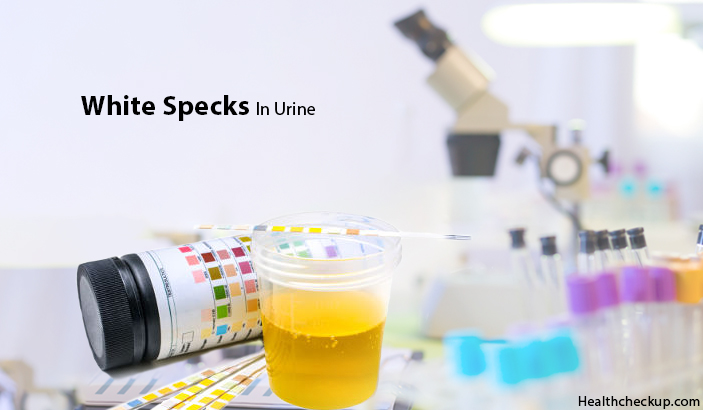In relatively healthy individuals, kidneys function optimally to maintain water and electrolyte balance in the body along with excretion of nitrogenous waste products through urine.
It is a well-known fact that urine formation occurs in the kidneys. Normal urine appears slightly yellowish in colour and is free from any kind of particles or sediments.
Occasionally, one may notice abnormalities like the presence of white specks, blood or casts in urine with or without a set of signs and symptoms. This article will take you through what specks in urine mean, causes for white specks in urine in males and females and how to get rid of them.
What Do White Specks In Urine Mean?
- White specks in urine can be seen either with the naked eye or may be evident on a microscopic examination.
- Presence of white specks in urine commonly indicates an infection of the urinary tract or the genitals in men or women.
- In non-pregnant women and in persons who do not have any illness, white specks in urine can occur as a result of dietary and hormonal factors.
- Patients who notice white specks in urine may describe it as:
-
- White flakes in urine
- Cloudy or greyish substance in urine
- Milky urine
What Causes White Specks In Urine?
The table below mentions a list of possible causes for white specks in urine in both males and females along with their description:
| Cause | Description |
| Urinary Tract Infection | Urinary tract infection or UTI is a common problem found in practice. It occurs more frequently in women than in men and presents with the following signs and symptoms:
|
| Retrograde Ejaculation | In this condition among men, instead of semen being ejaculation out of the penis, it goes back into the bladder; hence the term “retrograde” is used. Due to this condition, men may observe the passage of white specks in urine. Retrograde ejaculation is one of the causes of infertility in men and therefore needs to be identified and treated appropriately. |
| Bacterial Infection Of The Vagina | Vaginitis is a fairly common gynaecological condition among females. Candida is a frequently found organism. Signs And Symptoms Of Vaginitis Are
|
| Prostate Infection | Infection of the prostate is called prostatitis. Prostatitis can be acute or chronic and can present with the following signs and symptoms:
|
| Kidney Stones | Kidney stones are a fairly common condition in both men and women. Kidney stones up to 5mm in size can pass in the urine. Patients with kidney stones tend to have frequent urinary tract infections.
Signs And Symptoms Of Kidney Stones Are
|
| Sexually Transmitted Infections | These are also called venereal diseases which can be a cause for white specks in urine in men and women. Sexually transmitted infections include syphilis, chlamydia, genital herpes, Human Papillomavirus (HPV) infection and gonorrhoea.
As the name suggests, the illnesses are transmitted sexually. Signs And Symptoms Include
|
| Pregnancy | During pregnancy, white specks in urine are a common feature due to the numerous hormonal changes taking place.
A pregnant woman may observe white specks in urine throughout pregnancy. However, unusual foul smelling discharge needs to be reported to the doctor immediately. |
| Chyluria | Chyluria is a term used to describe the milky appearance of urine. This occurs due to chyle (lymph and emulsified fats) in urine. Chyluria can be seen in the following conditions:
|
How To Get Rid Of White Specks In Urine?
Presence of white specks in urine could be simply due to dietary factors or even due to some serious clinical conditions which need to be evaluated. For this reason, it is essential to seek medical help from a qualified doctor or a gynaecologist (for females) if the urine appears to have white casts or when it appears cloudy or milky.
Treatment for white specks in urine depends entirely on the possible underlying causative factors. Management of underlying clinical condition is the sole means to get rid of white specks in urine.
- Patients are advised to drink plenty of water to keep the urine clear and free from any kind of casts. Drinking plenty of water helps to flush the kidneys and this is especially applicable to patients who suffer from urinary tract infections and kidney stones. Larger stones which produce obstruction to the flow of urine need to be removed surgically.
- Certain hygiene measures which need to be followed by both men and women are:
- Keep the genital area clean and dry. Constant moisture at the genital area is highly prone to skin infections.
- Avoid using too much of soap as it may disturb the vaginal pH and irritate the skin of the vagina. This may produce infection.
- Use cleansing agents which have a low pH.
- Wear garments which are soft and breathable. Wearing tight underclothes increases the chances of infection.
- It is essential for each woman of the reproductive age group to keep a regular follow up with a gynaecologist.
Dr. Archana Tegwal is currently working as a lecturer in under-graduate faculty of Homoeopathy in Jawaharlal Nehru Homoeopathic Medical College, Parul University, Vadodara (Gujarat). She has done BHMS & MD in Homeopathic Materia Medica in March 2016 from Dr. V.H.Dave Homeopathic Medical College and Hospital, Anand (Gujarat). She also serves as a regional manager in NGO “World Healing Society Foundation”.









